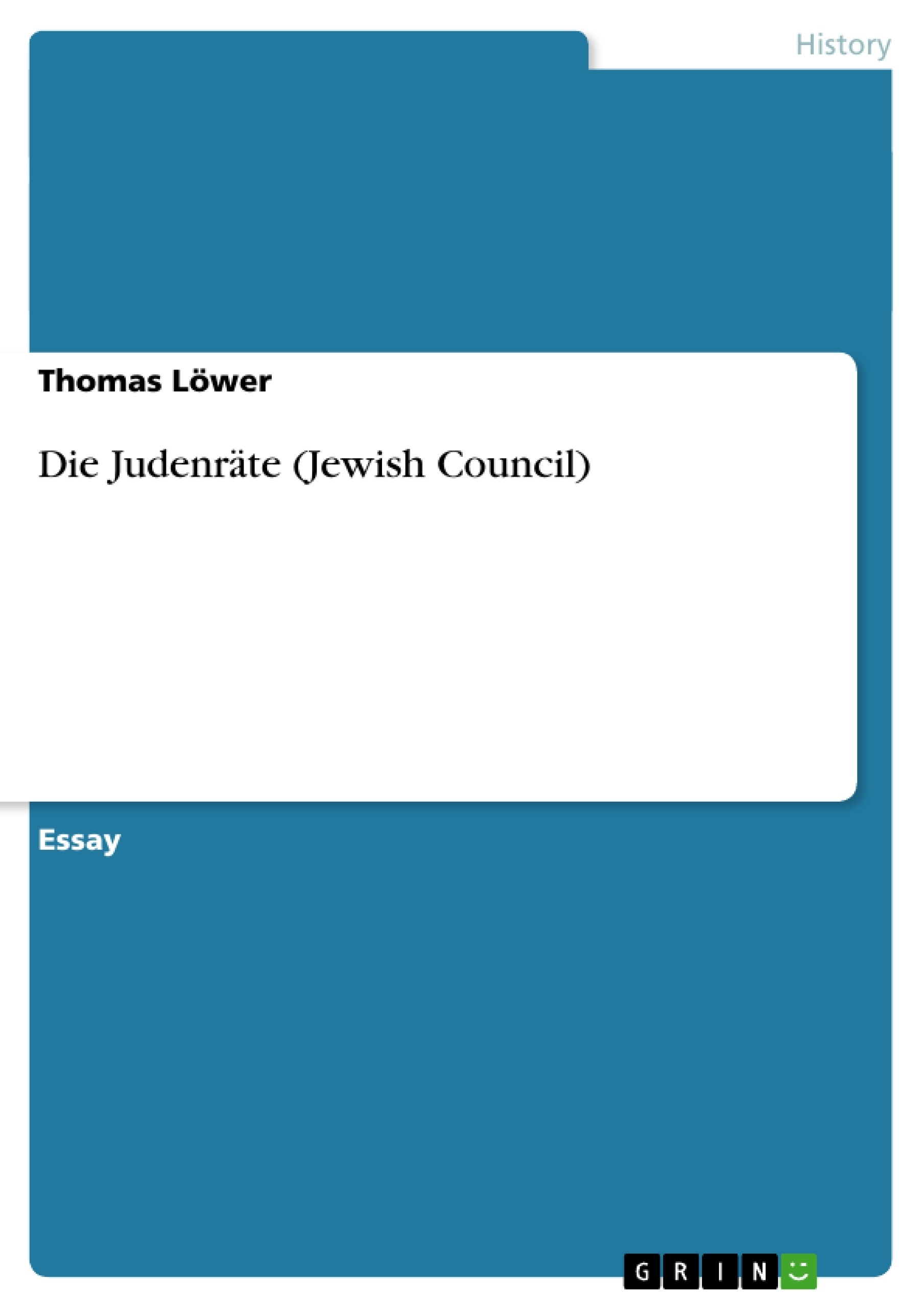Extrait
Die Judenrate
The history of the Judenrat, or Jewish Council, is a part of the history of the Holocaust which shows the topic’s complexity. The problem of the Judenrat was discussed the whole time after the war. Politicians and Historians disputed which role the Judenrat played or had to play in the National Socialists’ extermination mechanism.
This paper looks first at the ways the National Socialists established the Judenrate and what role they had to play in the National Socialists’ mind. This section is needed to give information about the background and the environment the Judenrate had to work in and to deal with. The second section will find out what motivated the members of the Judenrate to participate in the Judenrate and how they tried to achieve their goals. Insomuch that their major goal was to save as many lives as possible, this section will show if the Judenrate accepted armed resistance as opportune way or if they tried to follow the “rules.” In the third part, the reverse site of the Ghetto will be investigated. Did the ordinary people in the Ghetto understand what the Judenrate did to save as many lives as possible? It will also show if the Jews in the Ghetto would have liked to resist more against oppressive authority.
Insomuch that this paper is just a short one, only the highest representatives of the Judenrate are investigated. Furthermore, it might not be representative of all Judenrate and all Jewish Ghettos, because the available sources require selection by the author. The paper does not look at the Jewish Ghettos and the Judenrate in Western European countries and investigates only the situation of a few Ghettos in Eastern Europe.
After the war was finished, the problem of the Judenrate was ignored and the members of the Judenrat were stigmatized as collaborators and were claimed to be guilty of having supported the National Socialists.1 In the following decades, the view on the Judenrate has been changed as more sources were used to reconstruct the work of the Judenrat.2 In lot of European countries which were occupied by Germany during World War II, “Courts of Honor” were installed to put the members of the Judenrat on trial. The punishments of the these members were mostly exclusion from the Jewish community or the prohibition to hold any position in the community. Only half of the trials ended with the verdict of guilty because in a lot of cases it was not possible to find any proof for the member’s guilt.3
In Israel the problem of the Judenrate activated a political dispute between the Revesionistic-nationalistic opposition and the Zionistic leadership. The opposition claimed that the Zionistic leaders sold the Jewish interests to the National Socialists. The political dispute was so strong that one of the Zionistic leaders, Rudolf Reszo Kasztner, was shot on the street by a right-wing. Kastzner was put on trail at this time because he tried to redeem Hungarian Jews from Concentration Camps during World War II.4
The role of the Judenrate initiated a lot of controversial discussions. Although in some countries “Courts of Honor” were established and Israel tried to find out by official trials what role the members of the Judenrate played, it is not certain at all what motivated the Judenrate to support the National Socialists. This paper will shed light on, what reasons the members of the Judenrate might have had to become the National Socialist’s abettor.
In the Holocaust historiography the problem of the Judenrate is underrepresented. Only one monograph deals exclusively with the Judenrate. The literature this paper is based on Trunk’s major book about the Judenrat and the Diary of Adam Czerniakow, the chairman of the Judenrat in Warsaw.
The first point which has to be investigated is the establishment of the Judenrate. Adolf Eichmann first established the system of the Judenrate in Vienna in 1938. The Judenrate were used by the National Socialists to control, deport, and exterminate the European Jews.
In the following years the system of the Judenrate was established in the newly occupied countries in Eastern Europe. The decree establishing the Judenrate from November 28, 1939 says, that in “each municipality a body representing the Jews will be formed"5 In the decree the size of a Judenrat is also mentioned, which should have, dependent of the communities’ size, between 12 and 24 members. Quite important in this decree are the 4th and the 5th paragraphs. The 4th paragraph allows the local senior district officer to “decide whether the Judenrat roster reported to him should be approved. He may direct changes in the roster"6 Furthermore, the 5th paragraph describes the role which the Judenrat has to play. “The Judenrat is obliged to accept the orders of German agencies, through its chairman or his deputy. ”7 This decree shows how little influence the Judenrat had in the decision making process. They had no influence and were used by the National Socialists as a tool to drive their plans forward.
[...]
1 Rabinovici discusses the problem of ignoring the role of the Judenrate. He argues that especially the German historiography does not investigate this problemat. Rabinovici, Doron, Instanzen der Ohnmacht: Wien 1938-1945: der Weg zum Judenrat, Judischer Verlag, Frankfurt 2000, p. 412.
2 Fuks, Marian, Das Problem der Judenrate und Adam Czerniakows Wirken, in Judaica 39 (4), 1983, p. 242.
3 Wrobel, Piotr, The Judenrate Controversy: Some Polish Aspects, in The Polish Review 42 (2), 1997, p 227-230. Rabinovici, Instanzen, p. 412.
4 Rabinovici, Instanzen, p. 412-413.
5 Dawidowicz, Lucy, S., A Holocaust Reader, Library of Jewish Studies, Berhman House, West Orange 1976, A Holocaust Reader, p. 66.
6 Ibid. p. 67.
7 Ibid. p. 67.
- Citation du texte
- Thomas Löwer (Auteur), 2003, Die Judenräte (Jewish Council), Munich, GRIN Verlag, https://www.grin.com/document/28873
Devenir un auteur






















Commentaires